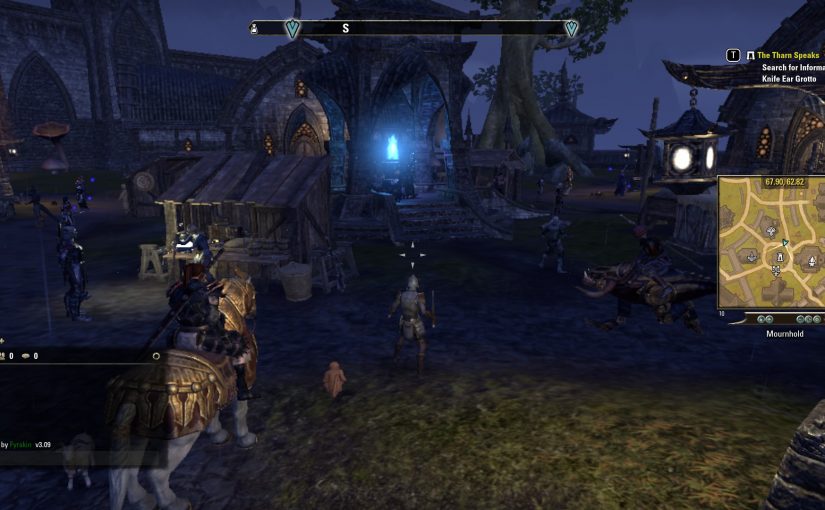Despite having faithfully played PC games of many genres since I was 4, I never played an massively multiplayer online roleplaying game (MMORPGs or MMOs) until Julie and I picked up The Elder Scrolls Online (ESO) at the recommendation of a friend. I could say that my self-restraint kept me away from extremely addictive MMOs, but in truth, I didn’t play any growing up because they required monthly subscriptions paid via credit card, and I didn’t have a credit card. These days, many MMOs only have a one-time upfront cost, which is how ESO got us.
Most people have heard of World of Warcraft, the most popular MMO with a population on par with a small country. In a MMORPG, players take the role of a heroes in a massive, shared world where you can run around, kill monsters, and complete quests while gradually making your character stronger. It is called an MMO because thousands of players all inhabit the same world running on a shared server where they can group up or perhaps fight each other. It’s like real life, except the words “+5 Experience Points” appear in the air when you squash a spider.
Prior to starting ESO, I had only a rough understanding of what you can do. I had heard about raids and crafting and just assumed there was only a binary appeal to it. However, I was surprised by how ESO (and presumably other MMOs) can appeal to players in different ways. Not only are there many reasons why people play video games, there are many reasons why people play MMOs.
I was initially drawn to the game for the quests and storytelling. As a dungeon master (DM), I come up with adventure plots on a weekly basis, and I always need fresh inspiration. Although ESO is set in a large, shared world, each player can go through a series of quests in the main story on their own. According to the always trustworthy internet, we are about half way through the plot, and I’m very excited to see where it goes.
Furthermore, I had played the last 3 Elder Scrolls games: Skyrim, Oblivion, and Morrowind. They were all single-player games set in Tamriel with rich backstory and lore defined through the world itself and characters. Just as I’m interested in storytelling for DMing, I’m also interested in world building to create a seemingly complete setting for my players.
However, I have continued playing regularly because I can play with Julie. I do enjoy RPG video games, but I stopped playing because they’re anti-social. I can dive deep into the story, but I do so alone with my earbuds in and slouched in front of my computer for hours. In an MMO, Julie and I can form a party to enjoy the story together. Even when we’re not playing, it’s a shared experience that we can talk about. In fact, it’s probably healthy because coordinating with someone else prevents me from spending too much time in-game.
Julie enjoys the crafting in ESO. In many MMOs, you can gather raw materials, such as herbs, metal ore, or plant fibers in the world. You then train skills to create items from the materials. I personally dislike crafting and would prefer that it not exist. I find it both addictive and deeply unsatisfying, and that feels awful. I feel compelled to pick up every little scrap, but I know that I would enjoy the game more if I could just move. However, Julie loves the steady progression and creation in crafting, so she can enjoy that part of the game.
Once over lunch at work, I mentioned how Julie and I enjoy totally separate parts of the game, and they were just as surprised about why I played RPGs. My coworker Alex played World of Warcraft strictly for the Player versus Player (PvP) content. I play ESO to complete quests against computer-controlled monsters in Player versus Environment (PvE), but most MMOs allow humans on opposing factions to fight each other in certain “PvP zones.” I myself don’t want to pit my character against other people, but having played many other competitive video games, I can see why that would appeal to some players.
My other coworker (also named Kevin) said that he played MMOs for the guild system. Many MMOs allow you to form large groups with dozens of people with the purpose of working together to fight through tougher dungeons and take down boss monsters. These raids require tremendous coordination to get everyone online and working together, but you can form deep bonds with these strangers in the shared purpose. Although my motivation was social at a very local level, he enjoyed the wider bonding experience within the community around the game.
And that’s not even the end of it. Some players enjoy the aesthetic customizations in the game. Julie spent a half-hour carefully crafting every minor detail of her character’s appearance to her liking, whereas I couldn’t skip those steps quickly enough. Players can buy mansions in-game and decorate them with more cosmetics and special furniture. And many players spend a lot of time and money on that.
MMO players get a bad rap for living in a virtual world at the detriment of their health and hygiene, but they’re not all the same. Video game developers have created addictive experiences through a variety of appeals, and that variety also creates diversity in the types of players as well. It may sound odd, but starting a MMO has been a happy part of my marriage, and as long as we’re enjoying the time together, it’s time well spent to me.
